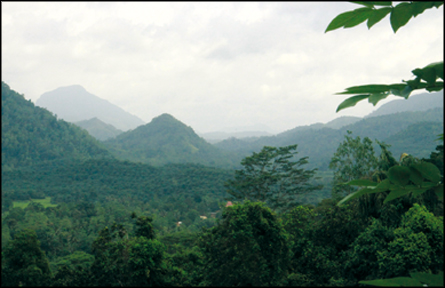Analog Forestry to preserve natural habitats
by Nilma DOLE
After the wake-up call of climate change sweeping across the world
like a tsunami-hit fever, people are now realizing the consequences of
their actions. No more cutting down trees or polluting the environment
since they can bring deadly natural disasters directly triggered off by
our own actions. There might not even be a tomorrow for our children if
this pattern continues. Today, developing countries blame the developed
countries for emitting carbon into the air at the cost of their
development. With the popular Kyoto Protocol, carbon credits look like
the way forward for many developing countries. However, with many carbon
credit companies mushrooming around, it surely looks like many are
taking carbon crediting to their advantage. However, the Carbon
Conservation Company invites 'concerned companies and individuals who
wish to obtain carbon offsets that are more than mere licenses to
pollute' to consider investing in the Company's 'sustainable carbon
credits'.
 |
|
Kanneliya Rainforest |
The Carbon Conservation Company (CCC) is a firm set up to offer
'carbon footprint consultancy and an ecologically responsible
alternative to the current carbon offset trading' by formally launching
its first vintage of voluntary carbon credits.
"Many are into carbon trading nowadays," says CEO of CCC, Subra
Eassuwaren. "They see it as a potential money-spinner for the developing
world. Sri Lanka is certainly no exception. But at CCC we go a little
further." He explained that by trading in 'sustainable carbon credits',
it creates opportunities for a special reforestation process called
Analog Forestry.
Subra calls it 'an ecologically responsible form of carbon trading'.
The Kyoto Protocol, whose purpose was to help reduce climate change,
or 'global warming' has the support of more than 180 countries and it is
vital for all countries to sanction it in order to preserve Earth for
future generations.
The Carbon Conservation Company does more than just plant trees, they
engage in long-term sustainable forest conservation like Analog
Forestry. Most carbon-capture projects work very crudely. For example, a
piece of land becomes a tree plantation. The trees are the kind used for
timber or papermaking. The amount of carbon they capture can be
estimated by their weight at maturity, and the number of carbon credits
sold is based on this figure. Then the trees are cut down and sold,
making yet more money for the plantation owners.
Yet, this doesn't help in Analogue Forestry or biodiversity.
According to the famous biologist, conservationist and inventor of
Analog Forestry, Dr. Ranil Senanayake, "rather than planting trees to
offset your carbon emissions, it's still not enough to create a
sustainable ecosystem. Your typical carbon-capture project is a tree
plantation, just like a tea plantation. How sustainable is a tea
plantation? What is it doing to biodiversity? Ruining it! These are what
we call monoculture projects; they're highly damaging to the
environment". Dr. Senanayake, who is also involved in the Forest Garden
Products Certification Scheme (a popular system for validating forest
products) states, "When you cut down all those trees to make paper or
dining-tables out of them, you end up returning all that carbon to the
atmosphere. That isn't doing much to secure a sustainable future for
your children or for the planet.
'That's where Analog Forestry comes in. It preserves natural habitats
and biodiversity by making them economically useful to local communities
in a sustainable way. And we finance it by carbon trading - you could
call it Fair Trade Carbon. It's a complex setup, involving big business
in the West, local communities in poor countries and a plenty of
ecological and forestry expertise. These factors interact to the benefit
of all parties involved - everybody profits."
An Analog Forest is a tree-dominated ecosystem similar in structure
and ecological function to a neighbouring, fully-developed natural
forest. "Essentially, the analog forester seeks to extend and replicate
existing forest coverage over a selected region".
"CCC is part of the Analog Forestry Network", said Dr. Senanayake.
'We've already begun work on our first project at Hiniduma near the
Sinharaja and Kanneliya protected zones. We're planning to extend that
forest with help from the folk of Hiniduma. They get the benefit of
forest produce from the project, as well as lots of other support from
us; we get the carbon credits, which we sell to socially responsible
companies in the rich world that want to do more than just fulfil to the
letter of their Kyoto-related obligations."
CCC's activities have already won praise and endorsement from a
number of prominent environmentalists and ecologists including Nobel
Peace Prize winner, Mohan Munasinghe, vice president of the
Inter-governmental Panel on Climate Change (IPCC). Prof. Munasinghe has
called it 'a brave and imaginative way of leveraging Kyoto to obtain
real, sustainable environmental benefits.' A number of other ecologists
and environmentalists have also offered their plaudits."Which is all to
the good," says Subra. "But our efforts have a hardheaded business side
to them as well. To ethically committed companies around the world, we
say: If you or your organization is looking to purchase carbon credits,
please take a close look at what we have to offer. We're not simply
trading 'licenses to pollute'. What we offer is a triply integrated
solution to the problems of climate change, habitat loss and rural
poverty. So partner with us, and help make a real difference."
|

